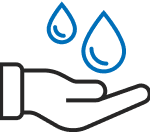Gimmicks & Gadgets Awards

Gimmicks & Gadgets Awards
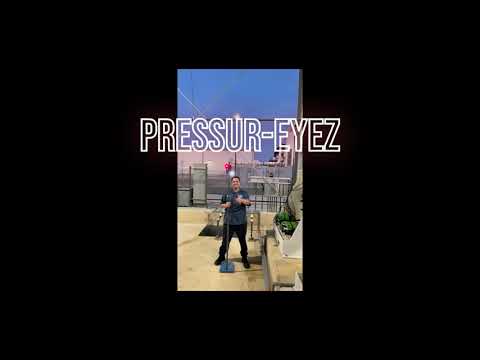
Pressure Eyes Solves Critical Staffing Problem
Jacob Saenz, Inframark, Camarillo, Calif., won the 2024 Gimmicks & Gadgets Contest with a device that allows a lone operator to relieve trapped pressure in chemical feed lines.
Read More
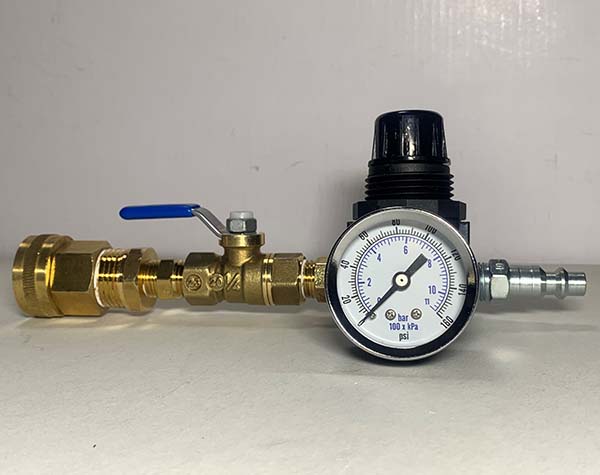
Slow Blow Backpressure Device Solves Common Plumbing Problems
Patrick Freeman, City of Fort Smith, Ark., initially used the Slow Blow to remove blockage from a customer’s vintage galvanized iron water pipe.
Read More
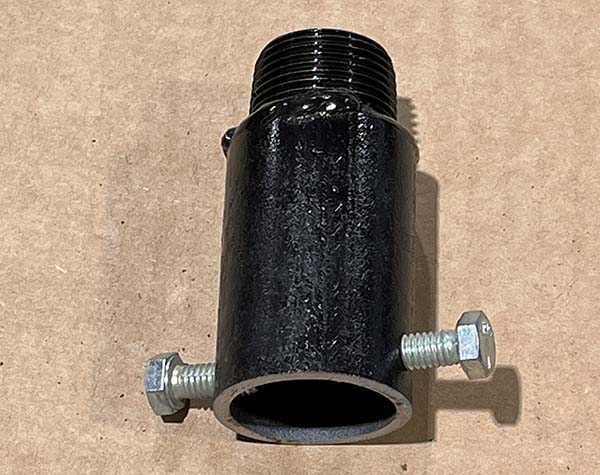
Ernie Fitting Simplifies Curb Box Repairs
The Ernie Fitting, developed by Ernie Scutella, Erie Water Works, Erie, Pa., is an inexpensive fitting used to repair curb boxes.
Read More
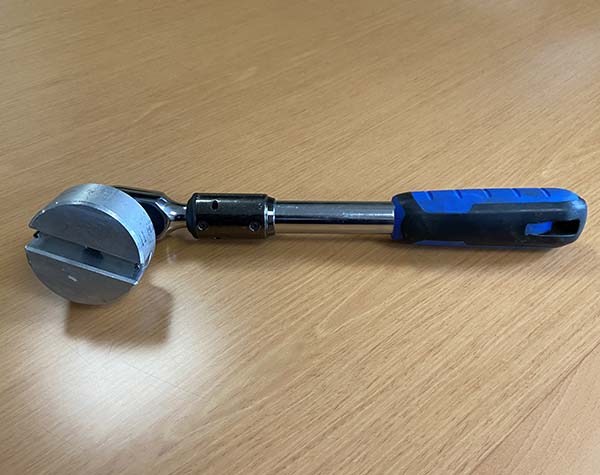
Setter Socket Improves Meter Pit Safety
Michael Watts, New Jersey American Water, Lawnside, N.J., worked with a local metals fabricator to create the Setter Socket, a socket wrench attachment that securely grips the valve head on 2-inch setter.
Read More
Sometimes operators have to think outside the box to solve a problem. Have you come up with an innovative solution to an everyday problem that saves your utility time and money?
Share your inventions and success stories with Opflow readers in AWWA’s annual Gimmicks & Gadgets Contest. Winners are eligible for cash prizes, featured in Opflow, and recognized at AWWA’s Water Infrastructure Conference.
The Award
Cash prizes of $800 (first place), $400 (second place), and $300 (third place), plus commemorative plaques to each of the three winners.
Frequency
Annually
Eligibility for Award
Anyone who submits an acceptable entry to Opflow.
Entry Requirements
An entry should be a novel and relatively simple mechanical device or procedure designed to provide a more efficient, safer, and/or simplified way to perform routine tasks or functions in the maintenance, operation, or construction of a water utility system. Commercially available products are not eligible.
Nomination Procedure
Submit your entry through the entry form below. Each entry will be screened by AWWA staff engineers and, if not found dangerous or otherwise unacceptable, will be approved for entry into the annual competition and for possible publication. Entrants will be notified concerning the status of their entry. Entries approved by the staff engineers may or may not be published in Opflow, but they will be judged. A signed release will be required before publication.
Nominating or Submission Deadline
May 31
Award Committee Membership
Three volunteer representatives from the Distribution & Plant Operations Division who serve on the ad hoc Gimmicks & Gadgets Committee.
Method of Selecting Award Recipient
The Distribution & Plant Operations Division staff secretary will forward pre-approved entries to the award judges. The judges will provide their list of winners to the staff secretary by June 28.
Rules and Guidelines
Gimmicks & Gadgets entries are judged on the basis of originality, simplicity, use, and application to the water industry. A successful entry will be a novel and relatively simple mechanical device or procedure. It will be designed to provide a more efficient, safe, or simplified way to perform a routine task or function in the maintenance, operation, or construction of a water utility system.
All entries must be submitted by a current AWWA member or member utility.
How to Write and Submit an Entry
If the thought of putting pen to paper or fingers to keyboard scares you more than confronting a hungry bear in a dark forest at midnight, then this section is for you. Relax, you’ll be glad to know that the first rule of writing a “Gimmicks and Gadgets” entry is that it doesn’t have to be perfect. Opflow editors will repurpose winning entries for publication.
Getting started
The idea for the device or procedure is really the most important part of the story. Everything else (the details of how to construct and implement, and so forth) can usually be set down in a simple standard format.
If you have ever solved a problem for your utility by inventing some sort of tool or new method for getting a job done more quickly, better, or for less cost to the utility, then you have created a gimmick or gadget. That was the hard part of the process. The next step is to put the idea on paper to share with your peers in the water industry—and possibly win a cash prize!
Entry Outline
Use this outline to help you get organized and tell your story.
As you’ll see on the previously mentioned entry form, begin with your name, title or position, affiliation or organization, mailing address, phone number, and e-mail. If you’re submitting the idea for another person, please provide the name of the inventor.
- Next, give the gadget or procedure a name (for example, the lid-lifter, meter box lock-out and so forth); any title that briefly describes what the gadget or procedure does will do. If it’s not easy to describe the idea in a couple of words, then describe it as well as you can in a sentence.
- Describe why the gimmick or gadget was needed. Include the problems that were experienced by the utility before the device was used or the procedure was implemented.
- List the equipment and supplies needed to make the gadget. This list should include the exact dimensions, sizes and quantities that are needed to build the device. If possible, include a total price of the supplies and the total amount of time it takes to build the device.
- The easiest way to explain how to build the device is to use a simple step-by-step approach. Begin with the first step you took to construct it. Be careful not to skip any steps. To reproduce the invention in their own workplace, readers need to know all the construction details.
- Finish by describing what was achieved by using the device. How much money and time has the device saved? List any other benefits that have resulted from its use, such as improved operator skills or record keeping, safer working conditions, increased job pride or streamlined office procedures.
Graphics and videos
Provide drawings or photos. The old adage “a picture is worth a thousand words” still holds true. An illustration helps the reader to understand the idea in a concrete way. Illustrations or photos must be submitted digitally in .tif or .jpg format. Digital images must be at least 300 dpi (high resolution).
Judging
Your entry will be screened by AWWA staff engineers and, if not dangerous or otherwise unacceptable, will progress to the next level of judging. All entrants will be notified about the status of their entries. Entrants progressing to the next level will also be asked to sign and return an official entry form and release. Subsequent judging is performed by three trustees from the Distribution & Plant Operations Division who volunteer to serve on the ad hoc Gimmicks and Gadgets Committee.
Winners are notified in July, and their entries are featured in the September issue of Opflow. Winning entries earn $800 for first place, $400 for second place, and $300 for third place. In addition, winners are honored at AWWA’s annual Water Infrastructure Conference in September. Honorable Mention-winning entries may or may not be published in Opflow. A signed release is required for all entries that are published.
Presentation of the Award
The Opflow editor will arrange for the cash awards and plaques to be presented at the AWWA Water Infrastructure Conference.
Award Submissions
Submission Deadline May 31
For questions reach out to opfloweditor@awwa.org.


Past Recipients
Congratulations to the past recipients of this prestigious award.
1st: Emergency Stem-Gripping Wrench Saves the Day, Shawn Turner (Watch Video)
2nd: Quick Filter Media Sampler Simplifies Collection Efforts, John Meyers (Watch Video)
3rd: Holy Roller Makes It Easy to Roll a Fire Hose, Nick Hoesel (Watch Video)
1st: Pipe Washing Station Improves Water Quality Tests, Masa Niiya, Jared Svagera
3rd (Tie): Device Provides Proof of Public Water Supply, Frederick Ramackers
3rd (Tie): Magnetic Clamp Streamlines Pipe Repairs, Charles (Dustin) Rollins, Joseph (Mathew) Cribb
(Note: There was a three-way tie for 1st place)
1st: Hitch Lifter, Steve Bell
Crack Pipe, Jim DeCasper
FlocView 2020, Tim Suddarth
1st: LZH Service Line Locator, Mike Blake
2nd: Chlorinate Water Overflow Prevention, Danilo Blanusa
3rd: Tank Plug for Sodium Hypochlorite, Casey Feilen
1st: Shine a Light on Meter Boxes, Mike Blake
2nd: Speed Key Increases Efficiency and Safety, James Martinez
3rd: Extract Troublesome Inner Hydrant Assemblies With Ease, Jim Pollett
1st: Coupling Tool Eases Pipe Repair, Steve Almyda
2nd: Jackhammer Storage Box Boosts Field Safety, James Martinez
3rd (tie): The RAT (repurpose-a-Tool) Improves Curb Stop Access, Tom Sheline
3rd (tie): Endcap Puller Reduces inquiries From Servicing Pressure Vessels
Shawn O’Callahan
1st: Swabbie Simplifies Cleaning Repaired Mains, John Lins
2nd: Construction Meter Assembly Reduces Contractors’ Load, Protects Water System, Scott M. Anderson, PE
3rd: Doublesnap Simplifies Duplicate Sample Testing to Ensure Compliance, R. Scott Lane
1st: Lighted Valve Key Illuminates Valve Nuts, Larry McIntyre
2nd: The Claw Simplifies Utility Locates, Mike Blake
3rd: Custom Wrench Offers a Break-Free Method to Close Plastic Valves , Kate Mowbray
1st: De-Icer Thaws Water Services, David Beck
2nd: Meter Box Critter Barrier Deters Rodents, Ken Rock, Curt Cluff, and Mike Buckley
3rd: Create Your Own Chlorine Cylinder Safety Stand for a Digital Scale,
Ralph Brecken
1st: Ironman Goes Deep to Save the Day, Phillip Maddox
2nd: Reverse Clamp Makes Meter Installation a Snap
Naomi Fletcher, Christian Racco, and Thomas Pelto
3rd: Motorized Cover Lifter Provides Mobile Access to Manholes , Jean-Marc Ouellet and Yvan Savage
1st: RO Membrane Pusher Makes Quick Work of Fouled Membranes, Travis Duff and Kevin L. Oestreicher
2nd: Hydraulic Unit Drives Hydrant Seat Removal ,Dennis Meyers
3rd: PVC Pipe Assembly Aids Cathodic Protection Testing
Brad C. Lee and Trung Nguyen
1st: Porto-Puller Helps Prevent Injuries, Nate Porto
2nd: Portable Mixer Enhances Chlorine Residual Monitoring
Tom C. Ramirez, Doug Beckstrand, Stan Rhodes, Ratch Reshaw, and Troy Ibbeson
3rd: Sludgeulator Cleans Up , Brian Pickard
1st: Lighted Meter Reader Solves Direct-Read Problems, Scott Inch
2nd: Valve Box Clamp Enhances Efficiency, Safety, David Beck
3rd: Kennick Deicer Thaws Water Sampling Stations, Ken Crane and Nick Vertelman
1st: Expansion Check Tool Keeps Tabs on Filter Media, Greg Anderson
2nd: Fire Hydrant Lift Eases Load, Richard Hardin
3rd: Hydrant Drain Hole Cleaner Gets the Job Done, Tom Golden, Bob Castellano
1st: Sprayer Device Streamlines Sodium Hypochlorite Cleanup, Ken Bumbalek
2nd: Valve-Actuator Lock Protects Against Vandalism, Shawn O’Callahan
3rd: Laboratory Placemat Eases Sampling Testing Procedures, Joel Long
1st: Spur Gear Valve Operator, Marvin Huffman
2nd: Trailer-Mounted Hydrant Diffuser, Dave Congdon
3rd: O2-B-Gone, Russell Simpson
1st: Filter Rock Spreader, Randy Moore
2nd: Meter Installation Support, Tony Brencloa
and Robert Munger
3rd: Tapping Safety Blanket, Michael D. Paul
1st: Nut Extractor, Joe Bracy
2nd: Turb-Assist, Stefanie J. Hunter
3rd: Pak-Rite Replaces Valve Packing Without Digging or Straining, David Harmony and Jack Tucker
1st: Beckman Bucket Calms Flying Pigs, Kathryn Beckman
2nd: Light Rod Illuminates Dark Meters, Alan Fredericksen
3rd: The Frog Keeps Zanjeros Cranking, Mark Perinksy
1st: Wilson Core Sample Retriever, Bill Soucie, Robert Madura, Mark Sandahl, and Ken Nitecki
2nd: Fire Hose Roller, Paul Meyer
3rd: Valve Installer, Mark Simpson, Dan Lewellen, and Larry Hamon
1st: Blue Box, Dallas County WCID No. 6 Employees
2nd: Gas Trap, Howard Pixley
3rd: Expedient Clean-Out Tool, Carl Anderson
1st: Aspirator System for Ozone, Frank Newell
2nd: Wheel Valve Key, Ron Marston
3rd: Bubble Collector, Greg Anderson
1st: Bearing Driver, Donald Boggs
2nd: Stem/Seat Removing Tool, Paul Haugen and Bill Wojtanowski
3rd (tie): Critical Valve, Brett Gehrke
3rd (tie): Hydrant Meter Assemblies, Larry Douglas
1st: Water Hose Chlorinator, Mark Greeley
2nd: Liability Reduced with Extended Valve Box Lid, Mark Cerbin
3rd: Tank-Vac Cuts Cleaning Time, Gary Briggs, Donald E. Mischka, and Henry Alcantar
Load More
Advertisement
